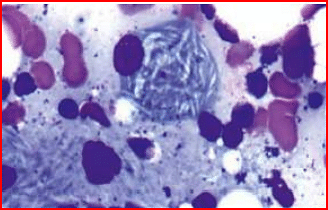Question:
The mass of hydrogen in gram required to completely saturate 1 mole of triolein is
The mass of hydrogen in gram required to completely saturate 1 mole of triolein is
Updated On: Jun 21, 2022
- 6
- 3
- 2
- 9
Hide Solution
Verified By Collegedunia
The Correct Option is A
Solution and Explanation
3 moles of $H_2$ are required for complete hydrogenation of triolein, hence mass of hydrogen $= 3 \times$ 2 = 6 g.
Was this answer helpful?
0
0
Top Questions on Lipids
- A patient presents with xanthomas on the Achilles tendon. Which of the following is the most likely diagnosis?
- A patient with multiple tendon xanthomas is found to have a serum cholesterol level of 398 mg/dL and an LDL level of 220 mg/dL. What is the most likely defect?
- Which of the following has the lowest melting point?
- Ceramides are
- A child presents with bone pain and hepatosplenomegaly. A trephine biopsy and aspirate show the following finding. Which of the following is the most likely enzyme deficient in this condition?

View More Questions
Questions Asked in COMEDK UGET exam
- Given that the freezing point of benzene is $ 5.48^\circ C $ and its $ K_f $ value is $ 5.12^\circ C/m $, what would be the freezing point of a solution of 20 g of propane in 400 g of benzene?
- COMEDK UGET - 2024
- Colligative Properties
200 ml of an aqueous solution contains 3.6 g of Glucose and 1.2 g of Urea maintained at a temperature equal to 27$^{\circ}$C. What is the Osmotic pressure of the solution in atmosphere units?
Given Data R = 0.082 L atm K$^{-1}$ mol$^{-1}$
Molecular Formula: Glucose = C$_6$H$_{12}$O$_6$, Urea = NH$_2$CONH$_2$- COMEDK UGET - 2024
- Colligative Properties
- An inorganic compound W undergoes the following reactions: $ W + \text{Na}_2\text{CO}_3 \xrightarrow{\text{O}_2 / \text{heat}} X + H^+ \xrightarrow{} Y(s) $ $ Y(aq) + \text{KCl} (aq) \xrightarrow{} Z(s) $ Z appears in the form of orange crystals and is used as an oxidising agent in acid medium. Identify the compound W.
- COMEDK UGET - 2024
- coordination compounds
- A current of 3.0 A is passed through 750 ml of 0.45 M solution of CuSO₄ for 2 hours with a current efficiency of 90\%. If the volume of the solution is assumed to remain constant, what would be the final molarity of CuSO₄ solution?
- COMEDK UGET - 2024
- Solutions
- For a reaction $ 5X + Y \to 3Z $, the rate of formation of Z is $ 2.4 \times 10^{-5} \, \text{mol L}^{-1} \text{s}^{-1} $. Calculate the average rate of disappearance of X.
- COMEDK UGET - 2024
- Stoichiometry and Stoichiometric Calculations
View More Questions
Concepts Used:
Lipids
Lipids are organic compounds that are nonpolar molecules, which are soluble only in nonpolar solvents and insoluble in water because of the polarity of the water.
Properties of Lipids:
Lipids are one of the family members of organic compounds, imperturbable of fats and oils. These molecules yield high energy and are mainly responsible for different functionings within the human body. Listed below are some important characteristics of Lipids such as:
- Lipids are oily or greasy nonpolar molecules that are stored in the adipose tissue of the body.
- Lipids are a heterogeneous group of compounds that are mainly composed of hydrocarbon chains.
- Lipids are energy-rich organic molecules, which provide energy for different life processes.
- Lipids are a class of compounds characterized by their solubility in nonpolar solvents and insolubility in water.
- Lipids are consequential in biological systems as they form a mechanical barrier dividing a cell from the external environment known as the cell membrane.